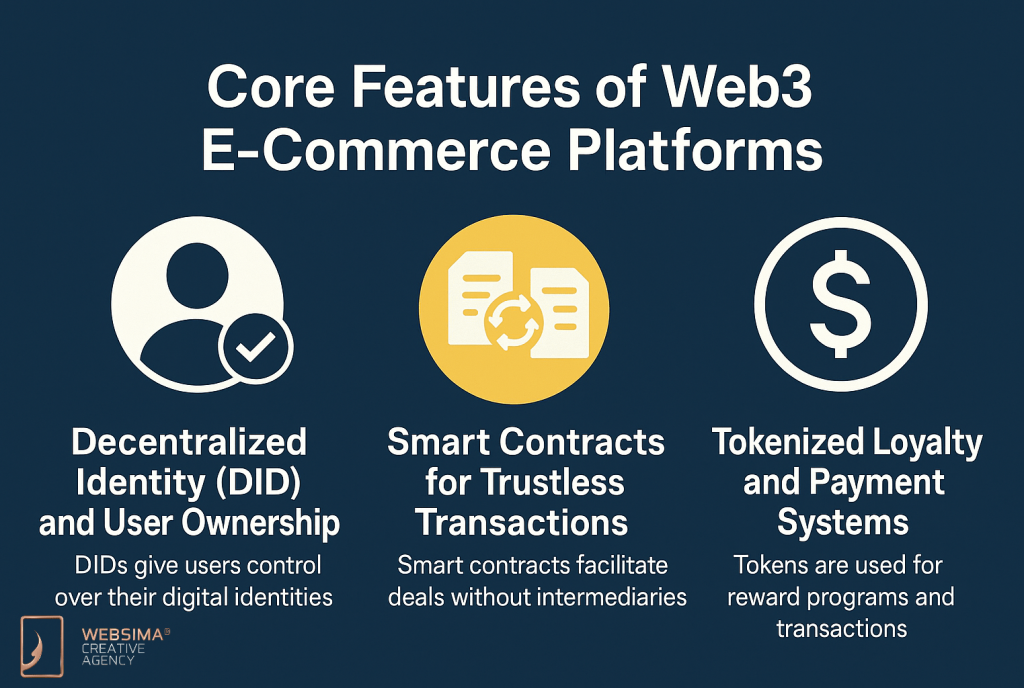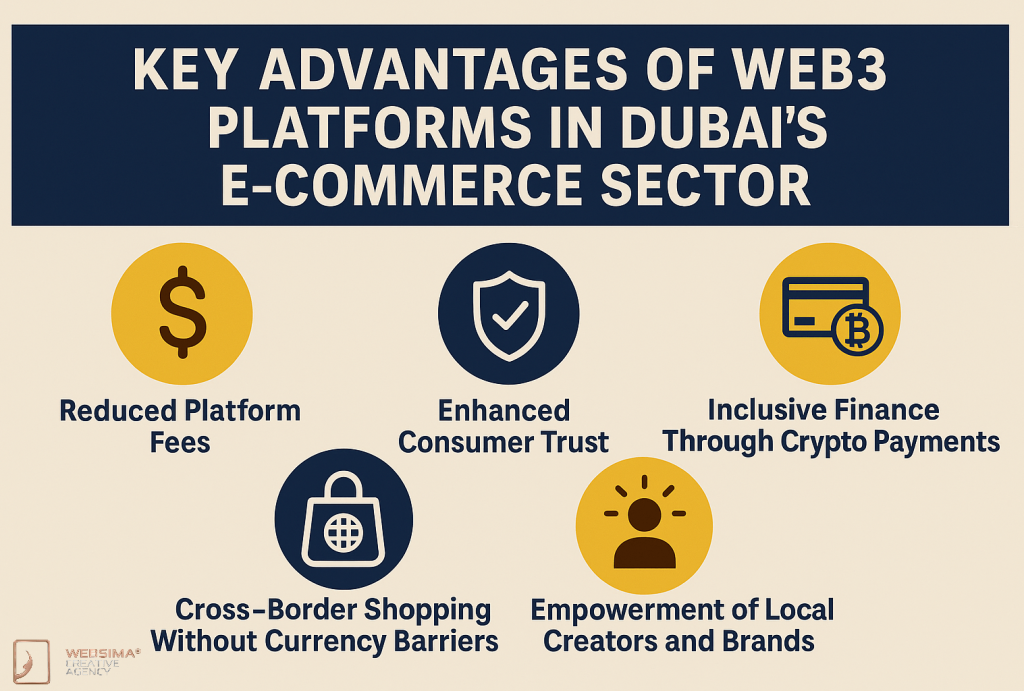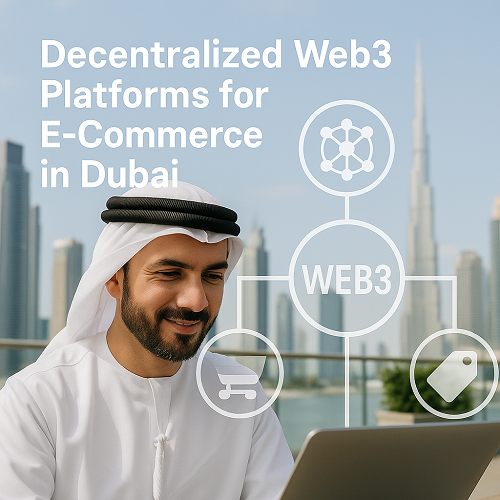As Dubai continues to assert its leadership in Web3 innovation, the city’s e-commerce sector is undergoing a radical transformation. The emergence of decentralized Web3 platforms is reshaping how digital commerce operates—from payment systems and data ownership to loyalty programs and smart contracts. This new generation of e-commerce leverages blockchain, tokenization, and user-centric platforms to foster transparency, reduce intermediaries, and deliver enhanced consumer trust.
For Dubai—a city that already boasts a highly digitized infrastructure and progressive regulatory framework as well as integrating blockchain into smart city initiatives—Web3 e-commerce presents an enormous opportunity to create decentralized marketplaces that align with the global shift toward data privacy, user empowerment, and financial inclusivity.
Dubai’s Strategic Alignment with Web3 Commerce
A Hub for Blockchain Innovation
Dubai has steadily positioned itself as a global epicenter for blockchain innovation. With initiatives like the Dubai Blockchain Strategy, the city is committed to using blockchain across government services, business operations, and digital commerce. The goal: make Dubai the first city fully powered by blockchain technology, reducing paper-based processes and increasing efficiency across sectors.
Additionally, the Dubai Chamber of Digital Economy supports the establishment of hundreds of tech startups by 2030—many of which are focused on blockchain and decentralized retail infrastructure.
Regulatory Framework for Web3 E-Commerce
A key driver of the Web3 e-commerce Dubai ecosystem and also enterprise e-commerce Web3 integration is proactive regulation from entities such as the Virtual Assets Regulatory Authority (VARA) and Dubai International Financial Centre (DIFC). These bodies ensure legal clarity around token issuance, decentralized wallets, and smart contracts. This regulatory confidence makes Dubai an ideal launchpad for decentralized commerce.
Core Features of Web3 E-Commerce Platforms

Decentralized Identity (DID) and User Ownership
Web3 e-commerce platforms rely on decentralized identity systems (DIDs), allowing users to control their own data. Unlike traditional platforms where personal data is stored on central servers, DIDs give consumers autonomy and privacy while improving platform security—an essential element of Dubai’s smart governance agenda.
Smart Contracts for Trustless Transactions
Smart contracts are blockchain-based programs that automatically execute agreements between parties. Generally speaking, smart contract programming languages and tools for UAE developers are making big changes across all sectors. In the context of Web3 e-commerce, these contracts eliminate the need for intermediaries in transactions, managing everything from payments to returns. This enhances trust and significantly reduces fraud.
Tokenized Loyalty and Payment Systems
Instead of traditional loyalty points, decentralized platforms utilize blockchain-based tokens that can be traded, staked, or redeemed. This innovation supports more transparent and engaging rewards systems. Many Web3 e-commerce Dubai startups are experimenting with NFT-based coupons, stablecoin payments, and decentralized finance (DeFi) incentives.
Key Advantages of Web3 Platforms in Dubai’s E-Commerce Sector

1. Reduced Platform Fees
Legacy e-commerce platforms often take between 10–30% in commissions. Decentralized platforms significantly reduce or eliminate these fees, allowing merchants to retain more of their earnings. This fee structure is especially appealing for Dubai-based SMEs and digital-first brands.
2. Enhanced Consumer Trust
Web3 technology provides complete transparency via immutable blockchain records. Products can carry on-chain verification for their origin, materials, and supply chain journey—enhancing consumer confidence and reducing counterfeit risks.
3. Inclusive Finance Through Crypto Payments
Web3 e-commerce platforms offer payment flexibility through cryptocurrencies like USDT, ETH, or locally accepted stablecoins. This opens access to unbanked populations and global customers.
4. Cross-Border Shopping Without Currency Barriers
Decentralized platforms simplify international transactions. Crypto payments remove the friction of currency conversion, enabling seamless cross-border purchases—especially important in a re-export-heavy market like Dubai.
5. Empowerment of Local Creators and Brands
NFT storefronts and smart contract-based shops give independent creators full control over their e-commerce experience. Dubai’s thriving fashion, digital art, and luxury goods sectors benefit from this direct-to-consumer model, without dependence on centralized aggregators.
Web3 E-Commerce Use Cases Already Emerging in Dubai
Case Study: Splyt Core and the Future of E-Commerce Plugins
Splyt Core is a decentralized inventory and fulfillment protocol designed for Web3 commerce. It’s gaining attention in Dubai’s tech circles for allowing sellers to list their products across multiple platforms via one smart contract while retaining full ownership and transparency.
DAO-Led Marketplaces
Dubai-based projects are exploring Decentralized Autonomous Organizations (DAOs) to manage governance within e-commerce ecosystems. Shoppers and vendors can vote on rules, product categories, and platform fees—promoting democratic digital retail infrastructure.
Integration with the Metaverse
The rise of immersive digital shopping is part of the Dubai Metaverse Strategy, which aims to contribute $4 billion to Dubai’s economy by 2030. Brands can now operate virtual shops in metaverse platforms connected to Web3 payment systems and logistics providers.
Technical Pillars Powering Dubai’s Web3 E-Commerce
Interoperability Standards
Smart contract protocols like ERC-721 and ERC-1155 allow NFTs and tokens to be used across different platforms. Developers in Dubai are building with cross-chain compatibility in mind to expand access and future-proof Web3 commerce.
Layer 2 Solutions for Scalability
To counteract Ethereum’s high gas fees, many Dubai-based Web3 platforms use Layer 2 technologies like Arbitrum and Polygon. These enhance transaction speed and reduce costs while maintaining security.
Decentralized Storage for Product Assets
Platforms often store product descriptions, images, and metadata using decentralized storage solutions like IPFS (InterPlanetary File System). This ensures data permanence, censorship resistance, and better transparency for both buyers and sellers.
Potential Challenges in Web3 E-Commerce Adoption
Regulatory Coordination
While Dubai’s VARA provides a clear framework, global harmonization remains a challenge. Cross-border sellers must consider how digital assets are classified abroad—whether as securities, utilities, or collectibles.
User Onboarding and Experience
Mass adoption depends on user-friendly onboarding. Concepts like gas fees, private key management, and wallet setup can overwhelm the average shopper. Solutions like social logins and non-custodial wallets are improving the learning curve.
Cybersecurity and Code Vulnerabilities
While decentralization reduces systemic risk, poorly written smart contracts remain exploitable. Security audits, bounty programs, and real-time monitoring are essential for any serious Web3 e-commerce platform in Dubai.
The Future of Web3 E-Commerce in Dubai
Dubai’s ecosystem is uniquely positioned to become the global testbed for decentralized e-commerce. With regulatory clarity, advanced blockchain infrastructure, and a population receptive to innovation, Web3 e-commerce Dubai is likely to define the future of online shopping in the MENA region and beyond.
Trends to watch by 2030:
- NFT-backed luxury products with authenticated supply chains
- DAO-led marketplaces governed by token holders
- Crypto-native loyalty and affiliate programs
- Fully automated logistics powered by blockchain IoT
- Immersive digital storefronts in metaverse environments
Conclusion
Dubai’s strategic investments in blockchain and digital regulation are paving the way for a revolutionary shift in e-commerce. Decentralized Web3 platforms offer transparency, user ownership, and global access—making the emirate an ideal location for next-gen commerce platforms.
For startups, enterprises, and entrepreneurs, the opportunity in Web3 e-commerce Dubai is immense and immediate. Whether through tokenized assets, NFT storefronts, or metaverse integration, the foundations are already being laid for a radically different shopping future.
Build Your Web3 Commerce Platform with Websima
At Websima, we specialize in launching Web3 platforms tailored to Dubai’s e-commerce ecosystem. From smart contract development to NFT integration and blockchain payment solutions, we bring your decentralized vision to life—compliant, scalable, and future-ready.
Whether you’re building a DAO-governed retail platform or a metaverse-based storefront, we’re here to provide strategic, technical, and regulatory support.
Talk to our Web3 experts and get started on building your decentralized e-commerce platform in Dubai today.





